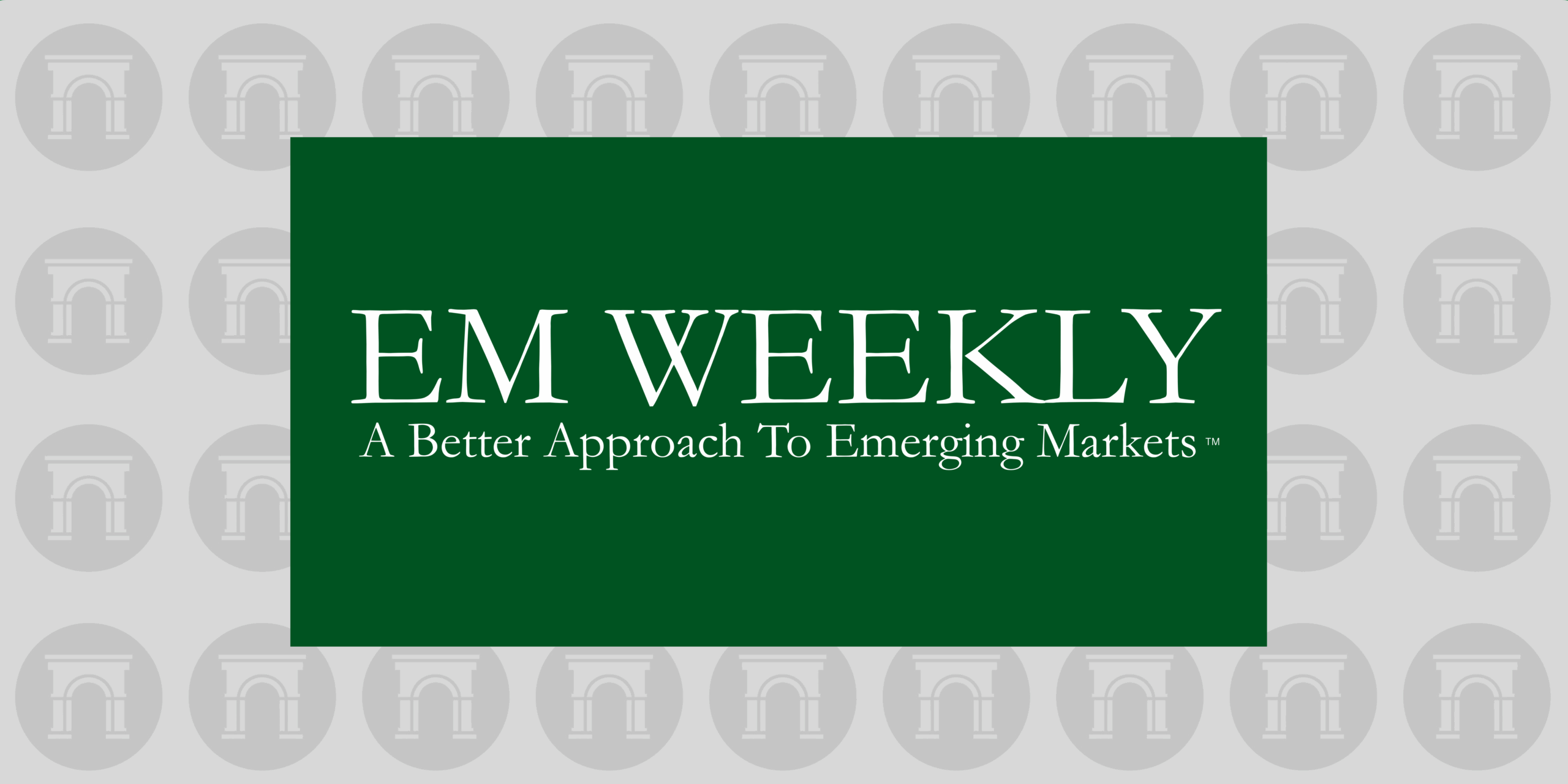Contents
Market Overview
Macro Update
Markets this week operated in the shadow of the U.S. federal government shutdown, which added to overall economic uncertainty. Depending on how prolonged the impasse is, impact on the U.S. economy varies from negligible (if resolved within days) to more meaningful, with implications for Fed policy.
Given that context, markets were mostly mixed and in a wait-and-see pattern. U.S. Treasury yields edged lower, with the 10-year and 30-year around 5 bps lower to around 4.1% and 4.7%, respectively. The dollar was under pressure for most of the week due to the shutdown, but recovered some lost ground and finished largely unchanged around 98 on the DXY. Brent and WTI prices extended their slide back to $65 and $60, respectively, amid expectations that OPEC+ will agree on additional supply over the weekend and potential fast-track production hikes in 2026. Gold posted a new high, $3,900 per ounce, as investors continued to seek inflation protection and portfolio hedging – but closed the week slightly off the high.
On the macro data front, U.S. public sector releases were not available this week due to the federal government shutdown, including the eagerly anticipated September jobs report. This forced market participants to extrapolate the latest signals on the economy from private sector data, which was on the softer side across the board. The JOLTS reports showed the total number of jobs openings increasing more than expected in August, however, it also signaled that workers are increasingly skeptical about the prospects of finding new employment and/or higher pay. The ISM manufacturing index remained in contractionary territory, below 50, for a seventh consecutive month, reflecting a pullback in both domestic and foreign new orders. The Conference Board headline consumer confidence index dropped to 94.2 in September from 97.8 in August, underperforming consensus expectations. Private-sector employment posted a decline of 32,000 jobs in September vs. the 51,000 expected by consensus; the prior month’s number was also revised down to a 3,000 contraction, from an increase of 54,000 previously.
Elsewhere, China announced a new RMB 500 billion policy-financing tool to support investment as the country aims to meet its annual growth target. The UK’s final 2Q GDP growth was better than expected on an annual basis, coming in at 1.4% vs. 1.2%, while the share of disposable income saved by British consumers increased, reflecting continued caution amid rising inflation and economic uncertainty. Preliminary headline inflation data across the euro area were mixed for member economies, but were in line with expectations at the bloc level, accelerating to 2.2% year-over-year, up from 2.0% in August, and 0.1% month-over-month. However, amid external economic pressures on the euro area, the acceleration in price dynamics is unlikely to last.
Turkish inflation for September surprised on the upside, accelerating for the first time this year, which will likely force the central bank to scale back on expected monetary policy easing by year’s end. The central banks in India and Colombia held policy interest rates unchanged at 5.50% and 9.25%, citing still elevated inflation and global uncertainty, but signaling space for policy easing in the near future.
On the geopolitical front, EU leaders discussed plans to establish a “drone wall” to intercept drone incursions amid a recent series of Russian violations of European airspace. In Morocco, anti-government protests turned deadly and spread to several major cities as thousands of people took to the streets, demanding better education and health care and voicing general discontent with the ruling monarchy. In Madagascar, the president dissolved his government after days of similar youth-led protests across the country amid power cuts and water supply problems.
Moldova, an important “battleground” between EU and Russian influence in Eastern Europe, saw the main pro-European party emerge victorious in parliamentary elections with more than 50% of the vote, well ahead of the pro-Russian bloc (<25%). Moldova’s pro-European president, Maia Sandu, said there had been “massive Russian interference” during the campaign.
In relation to the ongoing war in Gaza, Hamas said it would consider U.S. President Donald Trump’s plan to end the conflict and has asked for consultations with Qatar and Türkiye. The proposal’s first phase proposes a ceasefire and the exchange of Israeli hostages and Palestinian prisoners. Israel’s prime minister, Benjamin Netanyahu, revealed the plan at a meeting with President Trump, but faces intense opposition by religious nationalists in his own government.
EM Credit Update
Emerging Markets (EM) fixed income delivered a largely positive performance this week. EM hard-currency sovereign debt rose 0.34%, led by investment-grade bonds, which returned 0.42%, compared to 0.27% for high yield. At the index level, spreads widened modestly by 3 bps, with similar moves across both credit segments.
From a regional perspective, Africa outperformed, supported by broad-based gains across the continent. Ethiopia led returns as optimism grew around its external position, fueled by a sharp increase in export revenues from coffee and gold – both of which have doubled year-over-year. The stronger trade balance has bolstered investor confidence, despite the ongoing debt restructuring process. Mozambique also rallied after JPMorgan removed it from its list of high-risk sovereigns, citing improved debt sustainability and a narrowing risk premium. The upgrade, alongside stable inflation and record-high domestic credit growth, contributed to a more constructive macroeconomic outlook.
Latin America underperformed the broader EM basket, although regional returns remained marginally positive. Argentina led losses as optimism faded amid mixed signals from Washington on financial assistance. U.S. officials clarified that no direct funding would be provided, raising concerns over the durability of Argentine President Javier Milei’s stabilization efforts in the face of a weakening peso and upcoming midterm elections. Ecuador also underperformed as protests erupted in response to the government’s decision to remove a long-standing diesel subsidy, sending fuel prices higher by nearly 50%. The unrest, led by Indigenous and labor groups, resulted in road blockades, a nationwide strike, and a 60-day state of emergency. These developments heightened political risk and weighed on Ecuador’s bond prices as investors reassessed fiscal and governance risks.
Local-currency debt returned 0.29%, supported by a pullback in the U.S. dollar. Indonesia, Hungary, and Peru outperformed, benefiting from favorable rate dynamics and improving domestic sentiment. In contrast, the Dominican Republic and Thailand lagged, with the former under pressure from weaker growth data and the latter weighed down by political uncertainty and rising oil prices, as well as by strong signaling by the Thai central bank on preference for a weaker currency.
EM corporate debt posted a modest 0.11% gain for the week, with performance diverging across credit quality. Investment-grade corporates rose 0.31%, while high-yield names declined 0.17%. Index-level spreads widened by 6 bps, with high-yield spreads moving 8 bps wider vs. 4 bps for investment grade. Argentine corporates underperformed alongside sovereign weakness. Turkish corporate credit also came under pressure as liquidity concerns deepened. Bonds from companies like Wesoda and Vestel sold off on the back of political and credit-specific headlines, with Wesoda’s bonds falling sharply following the detention of a key shareholder amid a broader government crackdown. Vestel was downgraded by Moody’s to Caa1, which cited deteriorating liquidity and weak operating performance. Rising credit risk, foreign-exchange volatility, and macro pressures prompted investors to reduce exposure, particularly as Fitch highlighted weakening profitability and asset quality across Turkish banks. In contrast, Asia corporates, predominantly investment-grade, outperformed as continued demand for high-quality credit supported the segment.
Primary market activity remained stable, with 15 new hard-currency deals pricing this week. Issuance included five sovereigns, one supranational, and nine corporates, with a balanced split between investment-grade and high-yield credits. Roughly 80% of new issuance originated from the CEEMEA region.
The Week Ahead
Both the Fed and ECB will publish minutes from their latest rate decision meetings, shedding more light on their decision-making and policy path outlooks. An OPEC+ meeting will determine November production levels, and the group is expected to raise oil supply again as part of its push to reclaim global market share. This is likely to put downside pressure on oil prices.
In Japan, the embattled ruling LDP party faces a leadership contest, and the winner will have the urgent task of starting to rebuild its political relevance. Parliamentary elections will conclude in the Czeck Republic, while Syria will hold elections for the first time since the fall of the Assad regime.
In terms of data, September CPI will be reported in Thailand, Vietnam, Colombia, the Philippines, Chile, Taiwan, Brazil, and Mexico, while the central banks in Poland, Thailand, Peru, and the Philippines will announce their rate decisions. Subject to developments in the U.S. government shutdown saga, markets might see information on U.S. initial jobless claims and the preliminary University of Michigan consumer sentiment index for October.
Fixed Income
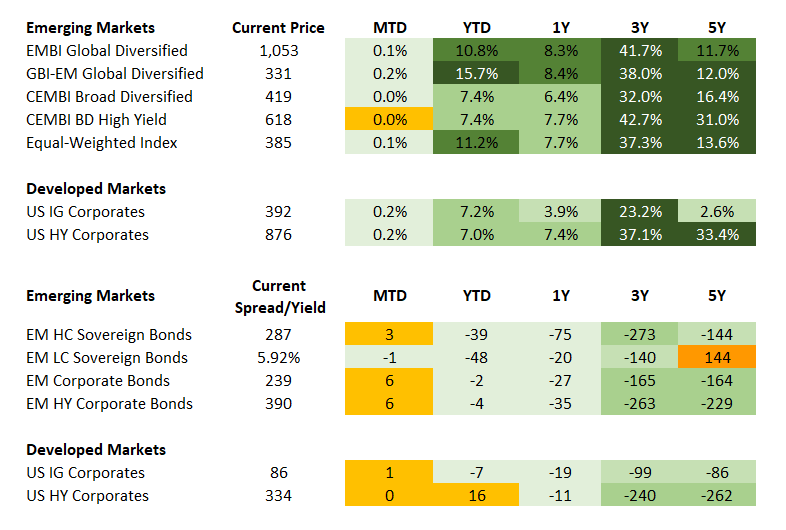
Equities
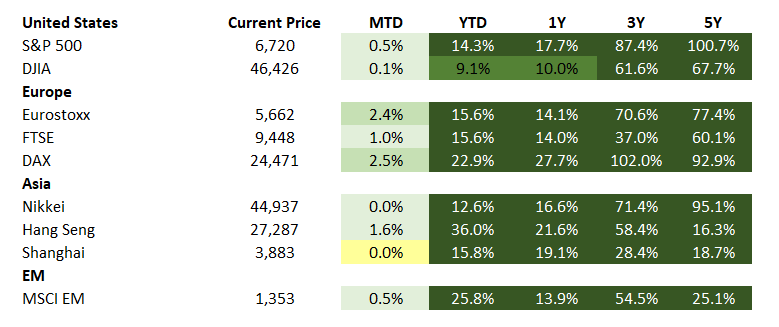
Commodities

Source for data tables: Bloomberg, JPMorgan, Gramercy. EM Fixed Income is represented by the following JPMorgan Indicies: EMBI Global, GBI-EM Global Diversified, CEMBI Broad Diversified and CEMBI Broad High Yield. DM Fixed Income is represented by the JPMorgan JULI Total Return Index and Domestic High Yield Index. Fixed Income, Equity and Commodity data is as of Oct. 3, 2025 (mid-day).
Highlights
Europe Works on Ukraine Financing as G-7 Prepares New Sanctions on Russian Oil
Event: EU leaders discussed concrete steps for leveraging frozen Russian assets to provide Ukraine with a €140 billion, no interest loan “as soon as possible.” In parallel, the G-7 group, comprising the United States, UK, France, Germany, Italy, Japan, and Canada, appeared to move closer to a range of new punitive measures against Russia’s economy, including tougher sanctions on key sectors such as energy, finance, and the military industry.
Gramercy Comment: The latest efforts to find creative financing solutions for Kyiv come amid increasing tensions between Europe and Russia in NATO’s eastern flank and the Trump administration’s fading interest in peace talks. These developments support Gramercy’s structural view that the conflict is likely to linger for the foreseeable future, clouding Ukraine’s economic and sovereign credit outlooks. The IMF recently upsized its forecast for the country’s external financing gap through 2027 to $65 billion, while Kyiv has also requested $60 billion for defense over the next year. Europe may have to meet these large funding needs on its own amid Washington’s disengagement. Despite incremental progress, internal disagreements on how to best leverage the frozen assets remain, with Belgium – the jurisdiction holding the bulk of the assets – strongly opposing any decision that might erode the EU’s rule of law and its attractiveness as an investment destination.
As such, we believe a scenario in which Russian assets are seized and given to Ukraine as a form of reparation remains highly unlikely.
Morocco Regains Investment Grade on Resilience
Event: S&P upgraded Morocco’s rating to BBB- with a stable outlook. The rating action was driven by economic resilience in the face of consecutive shocks, as well as by gradual fiscal improvement and a contained current account deficit. It comes amid an uptick in social unrest against corruption and calls for improvement in essential services in the context of recent spending related to the World Cup.
Gramercy Comment: We expect the Moroccan authorities to continue their constructive macroeconomic policy management and catalyze additional positive rating actions from Moody’s and Fitch. Strong relations with multilateral and bilateral donors, including a $4.5 billion flexible credit line with the IMF, provide comfort in the context of Morocco’s relatively open economy amid a fluid external and geopolitical backdrop. We anticipate that potential government measures to assuage social pressure will not materially jeopardize the country’s otherwise solid credit metrics.
Emerging Markets Technicals
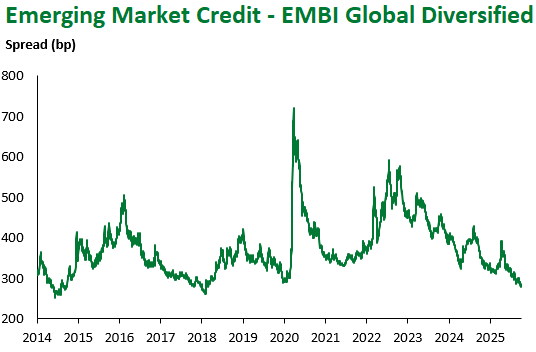
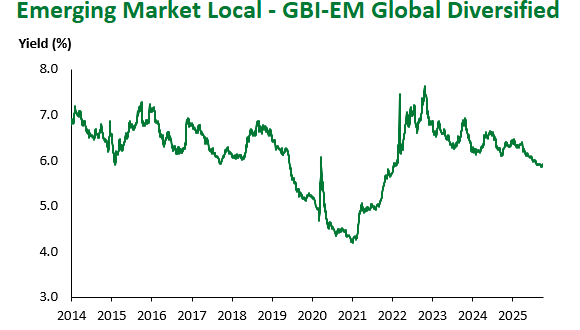
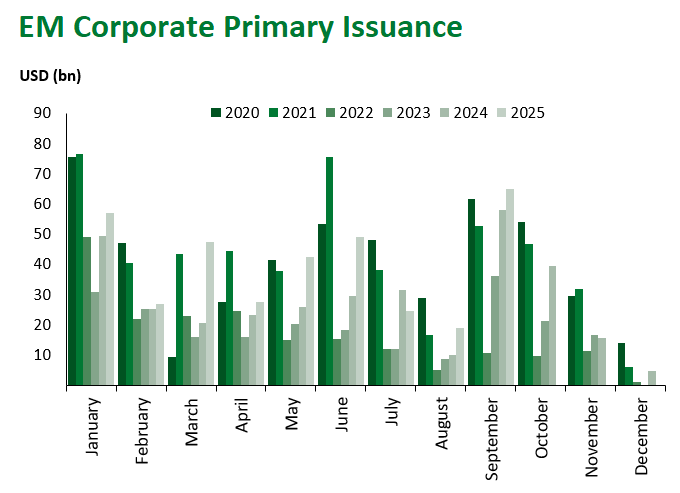
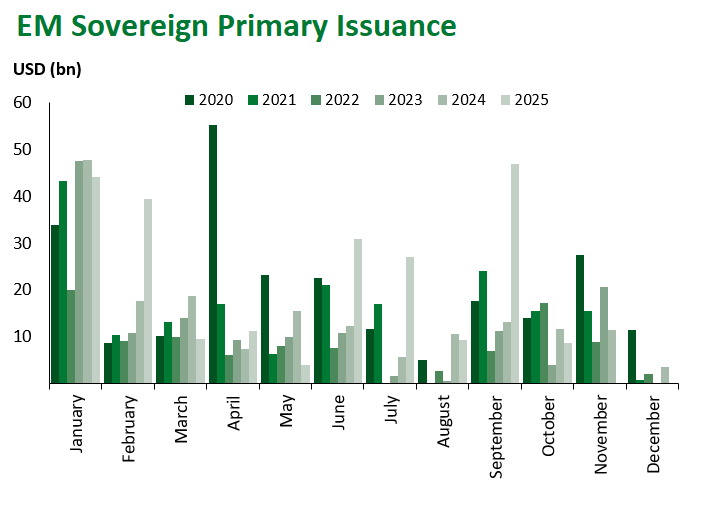
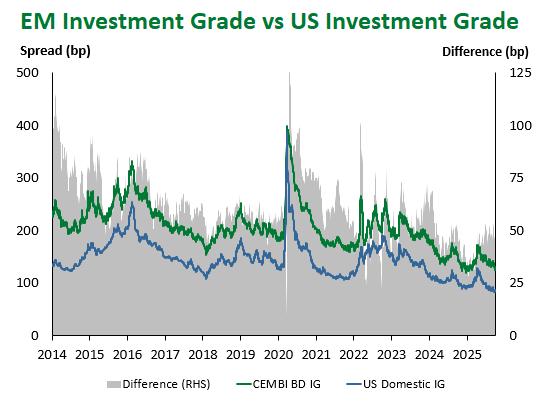
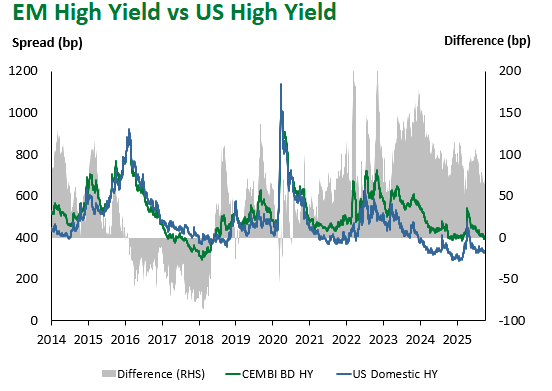
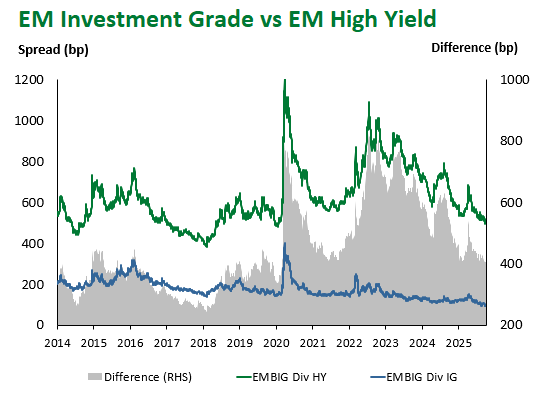

Emerging Markets Flows
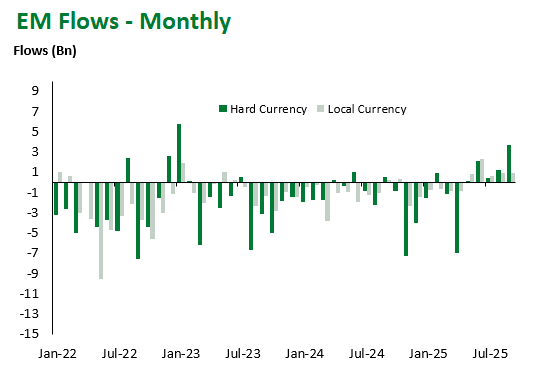
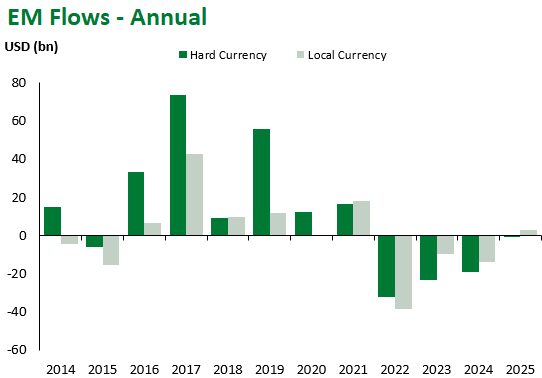
Source for graphs: Bloomberg, JPMorgan, Gramercy. As of Oct. 3, 2025.
For questions, please contact:
Kathryn Exum, CFA ESG, Director, Co-Head of Sovereign Research, [email protected]
Petar Atanasov, Director, Co-Head of Sovereign Research, [email protected]
This document is for informational purposes only. The information presented is not intended to be relied upon as a forecast, research or investment advice, and is not a recommendation, offer or solicitation to buy or sell any securities or to adopt any investment strategy. Gramercy may have current investment positions in the securities or sovereigns mentioned above. The information and opinions contained in this paper are as of the date of initial publication, derived from proprietary and nonproprietary sources deemed by Gramercy to be reliable, are not necessarily all-inclusive and are not guaranteed as to accuracy. This paper may contain “forward-looking” information that is not purely historical in nature. Such information may include, among other things, projections and forecasts. There is no guarantee that any forecasts made will come to pass. Reliance upon information in this paper is at the sole discretion of the reader. You should not rely on this presentation as the basis upon which to make an investment decision. Investment involves risk. There can be no assurance that investment objectives will be achieved. Investors must be prepared to bear the risk of a total loss of their investment. These risks are often heightened for investments in emerging/developing markets or smaller capital markets. International investing involves risks, including risks related to foreign currency, limited liquidity, less government regulation, and the possibility of substantial volatility due to adverse political, economic or other developments. References to any indices are for informational and general comparative purposes only. The performance data of various indices mentioned in this update are updated and released on a periodic basis before finalization. The performance data of various indices presented herein was current as of the date of the presentation. Please refer to data returns of the separate indices if you desire additional or updated information. Indices are unmanaged, and their performance results do not reflect the impact of fees, expenses, or taxes that may be incurred through an investment with Gramercy. Returns for indices assume dividend reinvestment. An investment cannot be made directly in an index. Accordingly, comparing results shown to those of such indices may be of limited use. The information provided herein is neither tax nor legal advice. Investors should speak to their tax professional for specific information regarding their tax situation.
